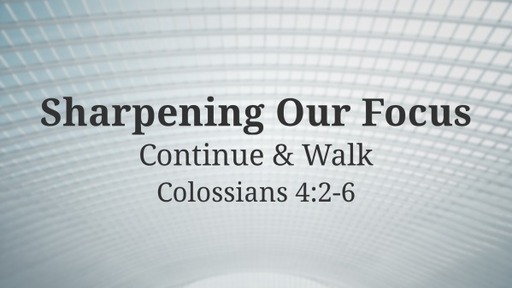Sharpening Our Focus: Continue & Walk

Continue in Prayer and Walk in Wisdom
We are called to prayer and wisdom.
Continue Steadfastly In Prayer
Be motivated by prayer, he says, “being vigilant in it with thanksgiving” (4:2). To be bound with persons in prayer secures a relationship, keeps it whole and growing, in a way nothing else can. When I pray for another from whom I may be estranged, I cannot remain the same in my feelings and in my separation from that person. When I pray for another person about whom I genuinely care, or even for a person I may not know, the power of love and caring is so generated within me that it flows out into the life of the other, or is “passed on” to the other in ways I may not even recognize.
Walk in Wisdom
It also means we must be alert to use the opportunities God gives us for personal witnessing. “Redeeming the time” means buying up the opportunity (Eph. 5:16). This is a commercial term and pictures the Christian as a faithful steward who knows an opportunity when he sees one. Just as a merchant seizes a bargain when he finds one, so a Christian seizes the opportunity to win a soul to Christ.
We should never say to anyone, “Now, take this with a grain of salt.” We must put the salt into our speech to make sure it is pure and properly seasoned. “Let no corrupt communication proceed out of your mouth” (Eph. 4:29). Our speech must be pure.
Salt was also added to the sacrifices (Lev. 2:13). Perhaps Paul was suggesting that we look on our words as sacrifices offered to God, just as our words of praise are spiritual sacrifices (Heb. 13:15). It would no doubt help us to say the right things in the right manner if we remembered that our words are looked on as sacrifices to God.
